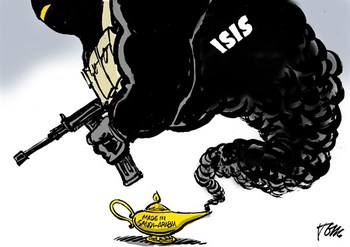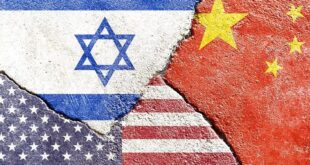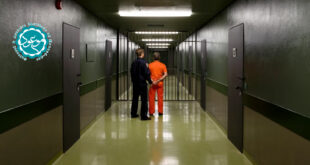Lebanese people received on Tuesday the news about the Republic of Lebanon joining the Islamic Military Alliance announced by the Saudi Arabia the midnight before, aimed at fighting terrorism!
The Saudi kingdom holds the anti-terrorism flag, at a time it plays a prominent role in nurturing and sponsoring terrorist organizations ranging from Afghanistan through Iraq and Syria, all the way to Yemen … not to forget declaring the death of ISIL* emir of the province of ‘Aden and Taiz’ in Yemen, Abu Obeida Al-kazmi, along with 62 of his operatives, which will not be the last evidence of such involvement.
Al-Kazmi was killed in the attack carried out by the Yemeni army and Popular Committees against the headquarters of leadership of the Saudi-US-led aggression forces in Bab al-Mandab area, which also killed the commander of the Saudi special forces in Yemen, Colonel Abdullah Al-Sahyan.
Riyadh announced that 34 countries, including Lebanon, are joining the alliance. Among its members are the State of Palestine which has no army to use in confronting the terrorism of the Zionist occupation over its territory, and Libya whose factions are still disputing over undefined power. In addition to the “Republic of Yemen” which the Saudi Arabia abbreviates in a President who is fugitive from his homeland, unable to do anything but to praise the Kingdom’s crimes against his own people, and its destruction of Yemen’s infrastructure, at the forefront the national army.
In Lebanon, the State Pillars have been carrying the banner of self-distancing for a long time, a pretext that they formed to escape from expressing a position towards the Syrian crisis, which cast a shadow on the Lebanese domestic politics. “Self-distancing” was the magic word which has long been echoed by those pillars to face the voices calling for the liberation of occupied Lebanese parts from the terrorist organizations, particularly Arsal eastern region and its barrens.
In a statement on Tuesday, Lebanese Prime Minister Tammam Salam stressed that he welcomes Lebanon joining the alliance, “since Lebanon lies on the front line against terrorism, where army and security forces are engaged in daily battles with terrorist groups, one of which is still holding nine of the Lebanese military personnel,” according to the statement.
In a new rhetoric which is far from self-distancing policy, Prime Minister stressed that Lebanon should “not hesitate to welcome any move that aims to mobilize all energies and to close the ranks to confront this scourge, which constitute the most significant challenge to the security and stability of our region.”
Prior to Salam’s statement, Al-Manar TV Website had a phone call with the Lebanese Minister of Labor, Sajaan Qazzi, who strongly denied being aware of the news, stating that, “I have communicated with the Secretary General of the Council of Ministers, and he told me that he had no knowledge of the subject.”
“We do not accept to join any religious alliances,” said Qazzi, but soon the statement of the prime minister was issued to declare that Lebanon has joined the alliance via a “phone call,” without turning to the constitutional frameworks!
Upon forming the alliance, the Saudi defense minister, and the deputy Crown Prince Mohammad bin Nayef, said the coalition will not target the ISIL takfiri group alone, but will also target “any terrorist organization that appears in front of us.”
So what terrorism bin Salman is speaking about? How effective such an alliance will be? And what are the Saudi classifications for terrorism?
According to the Lebanese constitution, Lebanon joining a military alliance requires the approval of the Council of Ministers of a treaty to be presented later before the Parliament to be duly approved.
The Minister of Labor’s statements confirm that the ministers themselves were unaware of the accession of the “Republic” to an alliance that drags Lebanon to battles set and drawn by the Saudi Arabia.
*ISIL is the common acronym used to refer to the so-called ‘Islamic State of Iraq and the Levant’ takfiri group operating in the region, mainly in Syria and Iraq.
 Mouood Mouood English Edition
Mouood Mouood English Edition




